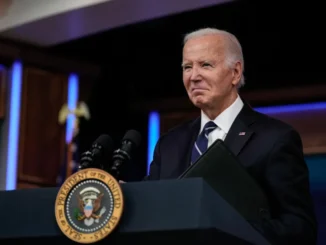
Airdrops and a maritime corridor will not be enough to substitute humanitarian aid transported by trucks into Gaza, where people are on the verge of famine, European Commissioner for Crisis Management Janez Lenarčič said on Thursday (14 March).
Land routes remain the “quickest, easiest and most efficient” way to get supplies into Gaza, Lenarčič told a group of reporters, including Euractiv, in Brussels.
“There is no meaningful substitute for land access (…) we call on Israel to open additional land crossings,” he said.
European Commission President Ursula von der Leyen travelled to Cyprus last week to launch the maritime corridor to Gaza with Cypriot President Nikos Christodoulides. A number of EU member states including Germany and the Netherlands pledged their intention to support the establishment of the corridor at the time.
It took about four months of diplomatic negotiations, involving the EU, US, UK and other countries, to convince Israel to agree to the maritime corridor.
A shipment organised by US-based charity World Central Kitchen carrying 200 million tons of aid departed from Cyprus to Gaza earlier this week, while future deliveries will be distributed in collaboration with local aid agencies and the Israeli military.
“This corridor, although a welcome addition, can only complement the land routes,” Lenarčič stressed, adding that the sea passage had been set up “exclusively because Israel is not opening more land routes”.
“You cannot in current circumstances provide sufficient supplies by maritime routes or airdrops because there is no real port [in the Gaza Strip],” he said.
The Pentagon this week sent military vessels to the Mediterranean Sea, where US troops will help build a temporary pier and dock to enable the delivery of more aid by sea.
The pier will be an upgrade of the jetty that is currently under construction by World Central Kitchen, a US charity run by the famous Spanish-American chef Jose Andres, Lenarčič said.
Ships using the new route are expected to carry “thousands of tonnes of supplies” a week, Lenarčič said.
But the aid sent by sea is incomparably lower in number than by land, he added, saying that nearly 500 trucks of aid – the equivalent of roughly 10,000 tonnes – are needed in Gaza each day.
Lenarčič also said he “noted with considerable hope” that the UN had declared one of its convoys had reached northern Gaza by land for the first time since 20 February.
“It is our hope and expectation that this route will be expanded to allow a surge in humanitarian aid,” he said.
‘Pockets of famine’
“There is a risk of famine,” Lenarčič, who has recently visited Israel, the Palestinian territories and Jordan, told reporters.
“We already have a very strong and credible indication that there are pockets of famine already in the Gaza Strip,” he added.
Gaza has been effectively sealed off since Israel began its war with Hamas in response to the militant group’s 7 October terrorist attack on the country.
The United Nations estimates more than half a million of Gaza’s 2.3 million people are on the brink of starvation.
Several UN agencies said earlier this month that child malnutrition levels were “particularly extreme” in the northern part of the enclave.
“What is needed is very clear: a surge in humanitarian aid into Gaza and its distribution throughout Gaza,” Lenarčič said.
This would need to go hand in hand with “an end of fighting that has to last long enough for humanitarian aid organisations to get in and organise proper distribution,” Lenarčič added.
His comments come as the bloc’s leaders at their summit next week are expected to reiterate their call for an “immediate humanitarian pause leading to a sustainable cease-fire” in the Israel-Hamas war to allow for the delivery of urgent aid into Gaza, according to early draft summit conclusions, seen by Euractiv.
Work should start on a sustained peace process based on the so-called two-state solution — an outcome favoured by the US, Saudi Arabia and others that would allow Palestinians some autonomy, the draft, which is still subject to change, stated.
However, a reference to the EU’s funding of the UN’s main Palestinian relief agency (UNRWA) was met with objections by some EU ambassadors on Wednesday (13 March).
The US, along with more than a dozen countries, suspended its funding to the body in January after Israel accused 12 of the agency’s 13,000 employees in Gaza of participating in the deadly 7 October Hamas terrorist attack.
The UN agency, which runs schools, clinics and other social services in Gaza, and distributes humanitarian aid, “has a critical role to play because it has unmatched infrastructure”, the EU’s humanitarian chief said.
Earlier this month, the European Commission announced it will continue to fund the UN agency as probes continue into the allegations, with a first €50-million tranche out of a total of the €82 million payment foreseen for 2024 to be paid this month.
An independent review of the agency has been launched under former French Foreign Minister Catherine Colonna, and her final report is expected to be published later this month.



